Are you ready to embark on a journey into the world of Chi-Poo mixed dogs?
Picture yourself surrounded by the cutest furry companions, each with their own unique characteristics and facts to discover.
From their charming appearance to their playful temperament, there is so much to learn about this delightful breed.
So, why wait any longer?
Let's dive into the world of Chi-Poo mixed dogs and uncover why they are truly one-of-a-kind pets that will steal your heart.
Key Takeaways
- Chi-Poos are adaptable to different living situations, including apartments, due to their size and energy levels.
- When choosing a dog for an apartment, consider factors such as the size of the living space and the breed's energy levels.
- Some breeds are not well-suited for apartment living, such as those that are highly sensitive or independent thinking.
- Chi-Poos are generally small in size, have medium-length coats, and are described as playful, intelligent, and independent companions.
Chi-Poo Appearance
The Chi-Poo is a mixed-breed dog that typically has a medium-length coat and comes in various colors, making it a visually appealing choice for dog lovers. This adorable breed usually has a soft and fluffy coat that requires regular grooming to keep it looking its best.
Chi-Poos can come in colors such as cream, brown, blue, brindle, silver, grey, fawn, white, and black. Their coats can vary in texture, ranging from straight to wavy. With their charming appearance and diverse color options, Chi-Poos are sure to catch the eye of anyone who loves dogs.
Whether you prefer a lighter-colored Chi-Poo or one with a darker hue, this mixed-breed dog is sure to bring joy and beauty into your life.
Chi-Poo Temperament
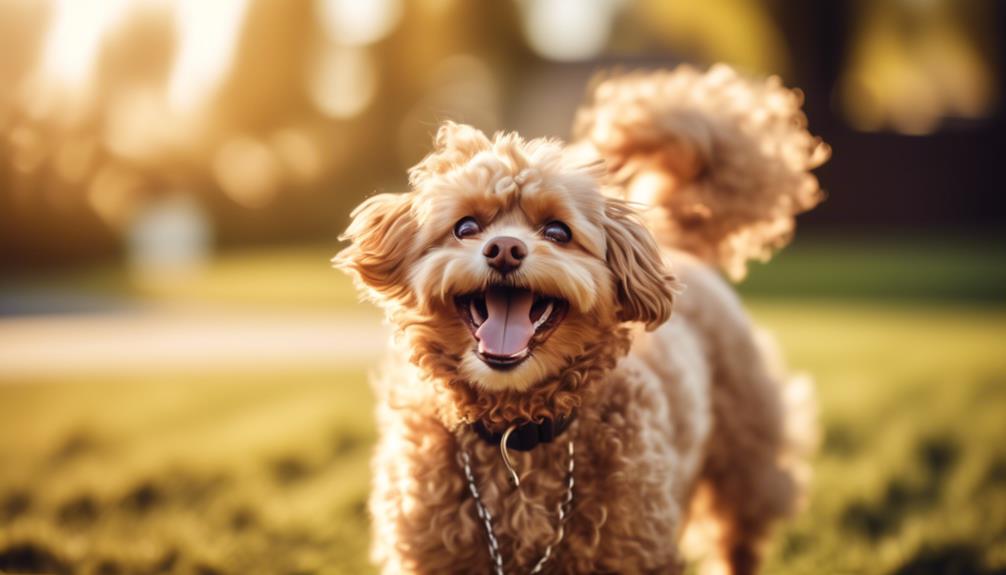
After exploring the charming appearance of the Chi-Poo and its various color options, it is important to delve into the temperament of this mixed-breed dog. Chi-Poos are described as playful, intelligent, and independent companions. They have high energy levels and enjoy being involved in daily routines. Unlike their parent breeds, Chi-Poos can tolerate being left alone for long periods. They are energetic and enjoy participating in activities like walks and play sessions. Chi-Poos adapt well to different environments and are suitable for both single-person families and households with kids. Chi-Poos are generally healthy, but they may be prone to certain health issues such as overactive tear glands, hypoglycemia, glaucoma, and luxating patellas. Regular veterinary checkups are important to detect any health concerns early. Good care and maintenance are crucial for their overall health. Consult with a veterinarian for specific care recommendations for your Chi-Poo.
| Temperament | Description |
|---|---|
| Playful | Chi-Poos have a playful nature and enjoy engaging in activities like play sessions and interactive toys. |
| Intelligent | Chi-Poos are smart dogs that can quickly pick up commands and learn new tricks. They enjoy mental stimulation and challenges. |
| Independent | Chi-Poos have an independent streak and may exhibit a strong-willed nature. They may require patient and consistent training. |
| Energetic | Chi-Poos have high energy levels and enjoy participating in daily exercise routines such as walks, runs, or playtime. |
Chi-Poo Size and Weight

To understand the size and weight of a Chi-Poo, it's important to consider their mixed-breed heritage and the variations that can occur within this hybrid dog. While there are no specific size standards for Chi-Poos, they're generally small dogs that weigh between five to 20 pounds and stand five to 15 inches tall at the shoulder.
However, it's worth noting that there can be variation in size, with some Chi-Poos being smaller or larger than the average. The size and weight of a Chi-Poo can be influenced by factors such as the size of their Chihuahua and Poodle parents, as well as the specific genes they inherit.
It's always best to consult with a reputable breeder or veterinarian to get a better understanding of the potential size and weight range for a Chi-Poo.
Chi-Poo Coat and Colors
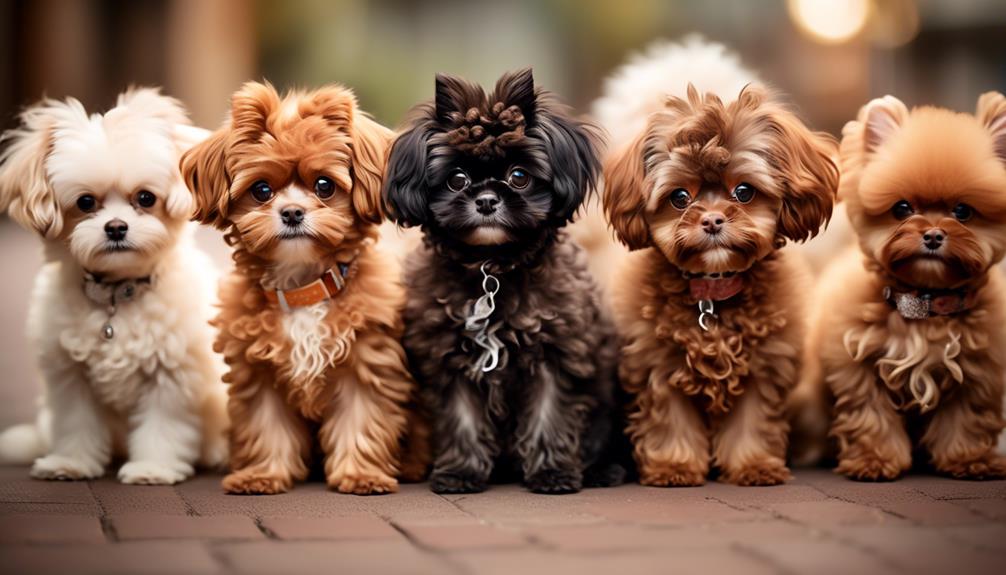
Chi-Poo dogs have a wide range of coat colors and textures, making them a visually diverse and appealing hybrid breed. The colors of Chi-Poo coats can include cream, brown, blue, brindle, silver, grey, fawn, white, and black. These mixed-breed dogs usually have medium-length coats, which can make them a good choice for allergy sufferers.
The texture of their coats can vary as well, ranging from straight to wavy or even curly. Some Chi-Poos may inherit more Chihuahua-like coats, while others may take after their Poodle parent. This variety in coat colors and textures adds to the unique and charming appearance of Chi-Poos, making them even more attractive as companions.
Chi-Poo Health Concerns
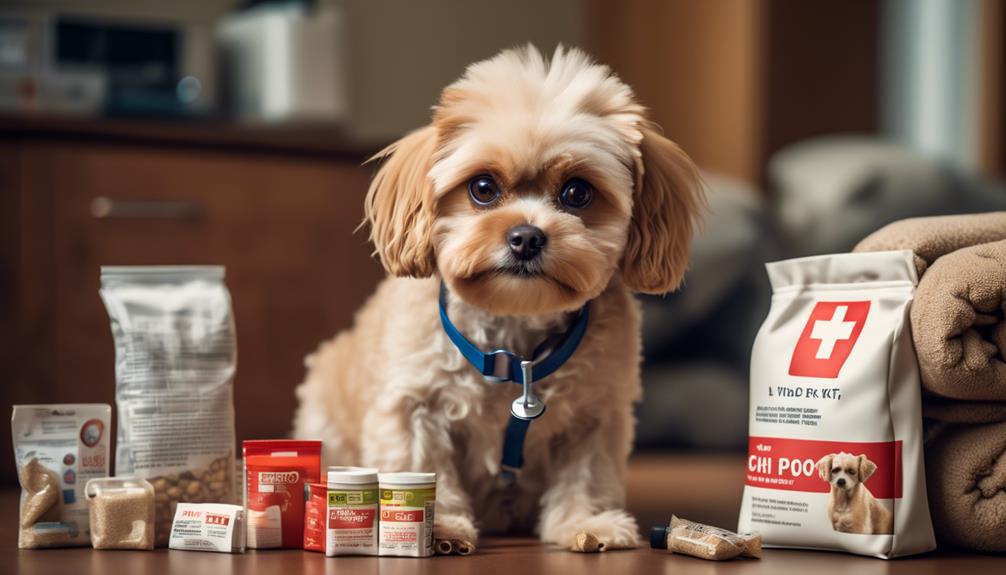
When considering the health concerns of Chi-Poos, it's important to be aware of certain conditions that they may be prone to. Here are three common health issues that Chi-Poos may experience:
- Overactive Tear Glands: Chi-Poos often have excessive tear production, leading to tear stains on their fur. This can be managed with regular cleaning and grooming.
- Hypoglycemia: Chi-Poos are at risk for low blood sugar levels, especially when they're puppies. It's important to monitor their food intake and provide small, frequent meals to prevent hypoglycemic episodes.
- Luxating Patellas: This is a condition where the kneecap dislocates from its normal position. Chi-Poos may be prone to this due to their small size. Regular exercise and maintaining a healthy weight can help prevent this condition.
Remember to schedule regular veterinary checkups for your Chi-Poo and consult with a veterinarian for specific care recommendations.
Chi-Poo Energy Levels

Chi-Poos are known for their high energy levels and enjoyment of daily activities. These mixed breed dogs are lively and energetic, always ready for a play session or a long walk. They thrive on physical exercise and mental stimulation, so it's important to provide them with plenty of opportunities to burn off their energy.
Chi-Poos love to participate in daily routines and be involved in various activities. Whether it's playing fetch, going for a run, or engaging in interactive games, these dogs will be enthusiastic participants.
Their high energy levels make them suitable companions for active individuals or families who enjoy an active lifestyle. However, it's important to balance their exercise needs to prevent them from becoming overstimulated or restless.
Chi-Poo Adaptability
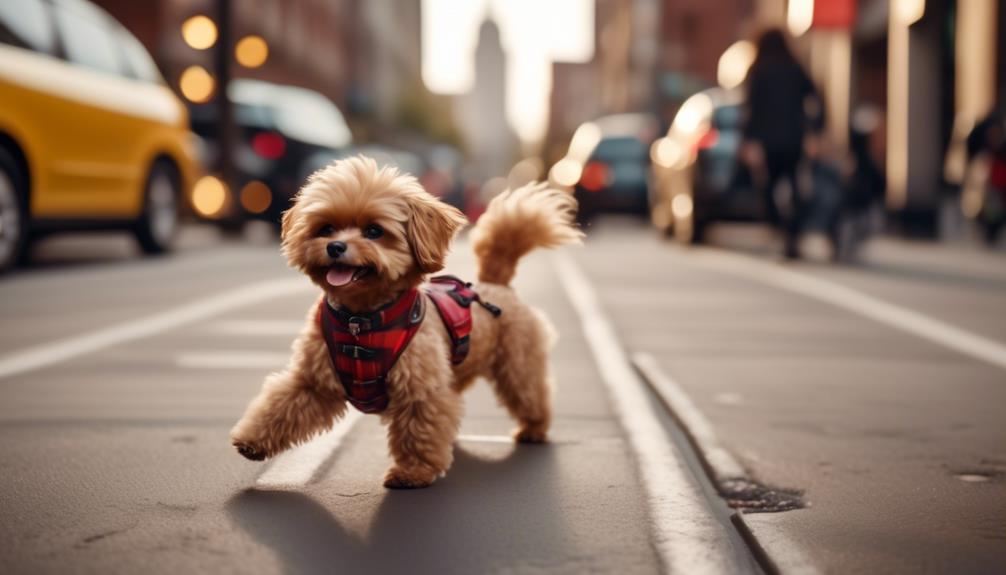
Adapting well to various living situations, the Chi-Poo mixed breed dog is a versatile companion. Whether you live in an apartment or a large home, the Chi-Poo can adapt to any environment. Here are three key points about the Chi-Poo's adaptability:
- Size isn't the sole determinant when choosing a dog for an apartment. While some large breeds can adapt well to apartment living with lower activity levels, certain small dog breeds with abundant energy can still find contentment in indoor playtime or brisk walks. Prioritize qualities such as being quiet, low-energy, and displaying polite behavior towards other residents.
- Consider your dog-owning experience and the energy levels of the breed when choosing a dog for an apartment. Some larger breeds may require more space and have higher energy levels, making them less suitable for smaller apartments. However, certain small dog breeds with higher energy levels can still thrive in apartments.
- Some dogs aren't well suited to apartment living, such as those that are highly sensitive, independent thinking, or assertive. Breeds that bond closely with their family may worry or panic when left alone. Additionally, breeds with very short coats and little body fat are vulnerable to the cold. Consider these factors when determining if the Chi-Poo is the right fit for your living situation.
Chi-Poo Intelligence
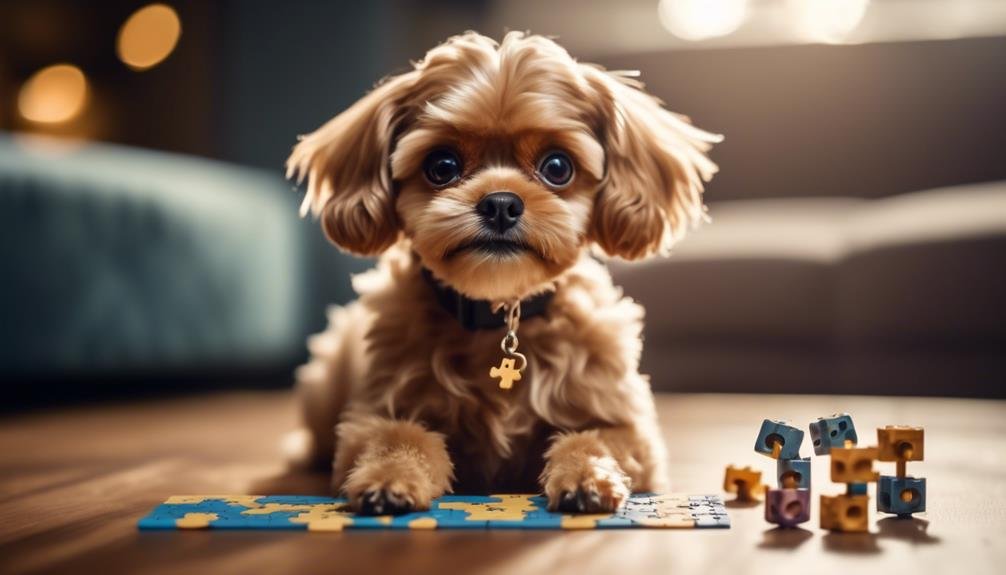
With their mixed heritage, Chi-Poos display an impressive level of intelligence that makes them quick learners and adaptable companions. They've inherited the intelligence of both their Chihuahua and Poodle parents, which are known for being highly intelligent breeds.
Chi-Poos have the ability to understand and respond to commands quickly, making training sessions easier and more efficient. Their intelligence also allows them to adapt well to different environments and situations, making them versatile companions.
Chi-Poos enjoy being mentally stimulated, so providing them with interactive toys and puzzle games can help keep their minds sharp and engaged. Their intelligence also makes them excellent problem solvers, as they can figure out solutions to challenges or obstacles.
Chi-Poo Training Needs
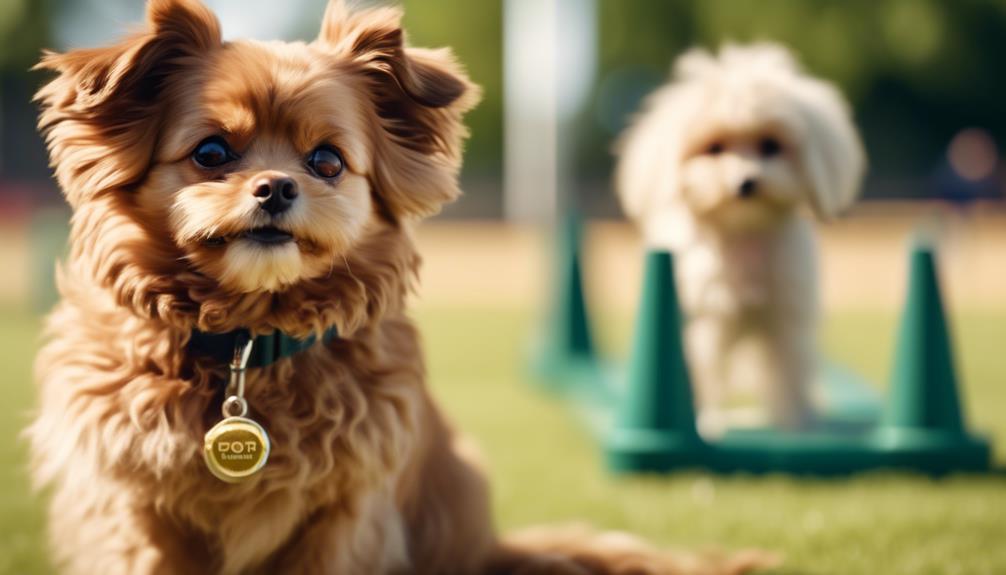
After discussing the impressive intelligence of Chi-Poos, it's important to address their specific training needs. These mixed breed dogs are highly trainable and eager to please, making them a joy to work with.
Here are three key aspects to consider when training a Chi-Poo:
- Positive Reinforcement: Chi-Poos respond best to positive reinforcement training techniques. Reward-based training methods, such as treats, praise, and play, are effective in motivating them to learn and obey commands.
- Consistency: Consistency is crucial when training a Chi-Poo. Establish clear rules and expectations from the beginning and ensure that everyone in the household follows them consistently. This will help prevent confusion and reinforce desired behaviors.
- Socialization: Chi-Poos benefit greatly from early and ongoing socialization. Expose them to a variety of people, animals, and environments to help them develop good social skills and become well-rounded dogs.
Chi-Poo Socialization
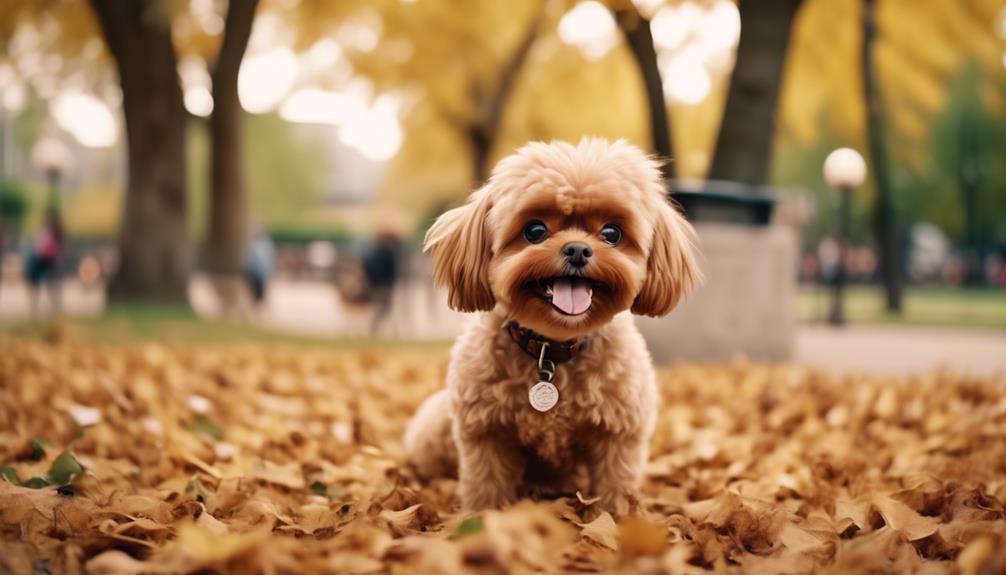
Chi-Poo socialization is essential for raising a well-behaved and confident dog. It's important to expose your Chi-Poo to a variety of people, animals, and environments from a young age. Take your Chi-Poo on regular outings to parks, pet-friendly stores, and other public places to expose them to new sights, sounds, and smells. Introduce them to different types of people, including children, so they learn how to interact appropriately.
It's also important to socialize your Chi-Poo with other dogs to teach them proper canine manners. Positive reinforcement training is key during socialization, rewarding your Chi-Poo for calm and friendly behavior. With proper socialization, your Chi-Poo will grow up to be a well-adjusted and well-mannered companion.
Chi-Poo Living Arrangements
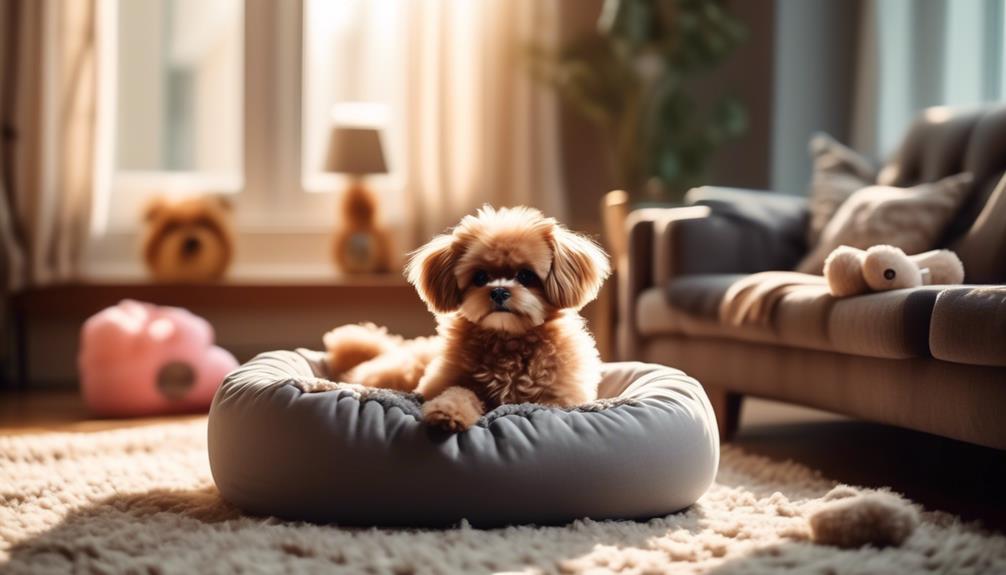
To ensure that your Chi-Poo is comfortable and well-suited to your living situation, it's important to consider their specific needs and adaptability when it comes to their living arrangements. Here are three key factors to consider:
- Apartment Living: Chi-Poos can adapt well to apartment living. Size alone shouldn't be the sole determinant when choosing a dog for an apartment. Some large breeds can adapt well to apartment living with lower activity levels. Certain small dog breeds with abundant energy can still find contentment in indoor playtime or brisk walks. Prioritize qualities such as being quiet, low-energy, and displaying polite behavior towards other residents.
- Tolerance for Being Alone: Some breeds are more prone to worry or panic when left alone. Anxious dogs can be destructive when left alone. Consider the dog's tolerance for being alone when choosing a breed. Some breeds are poorly suited to be alone for long periods of time.
- Tolerance for Hot and Cold Weather: Breeds with short coats and little body fat are vulnerable to the cold. Dogs with thick, double coats are more vulnerable to overheating. Breeds with short noses, like Bulldogs or Pugs, are less able to cool themselves off. Consider the dog's tolerance for hot and cold weather when choosing a breed.
Chi-Poo Compatibility With Children
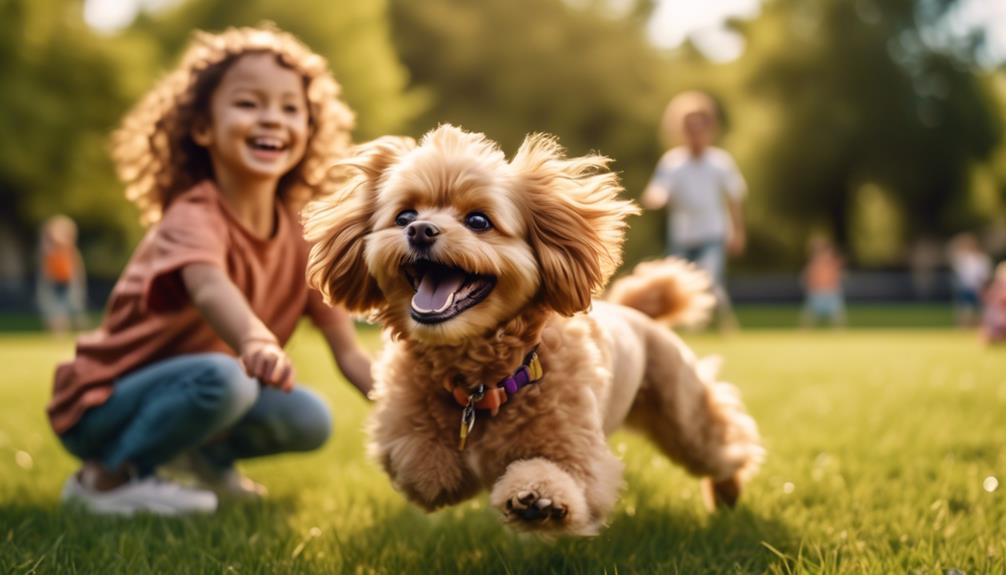
When considering the compatibility of Chi-Poos with children, it's important to assess their temperament and ability to interact safely and positively with younger family members. Chi-Poos are generally known for being playful, intelligent, and independent companions. They've high energy levels and enjoy being involved in daily routines.
Unlike their parent breeds, Chi-Poos can tolerate being left alone for long periods. They're energetic and enjoy participating in activities like walks and play sessions. Chi-Poos adapt well to different environments and are suitable for both single-person families and households with kids.
However, it's crucial to supervise interactions between Chi-Poos and children to ensure the safety of both parties. Additionally, teaching children how to properly and gently handle and interact with dogs is essential for maintaining a positive and harmonious relationship between Chi-Poos and children.
Chi-Poo Exercise Requirements
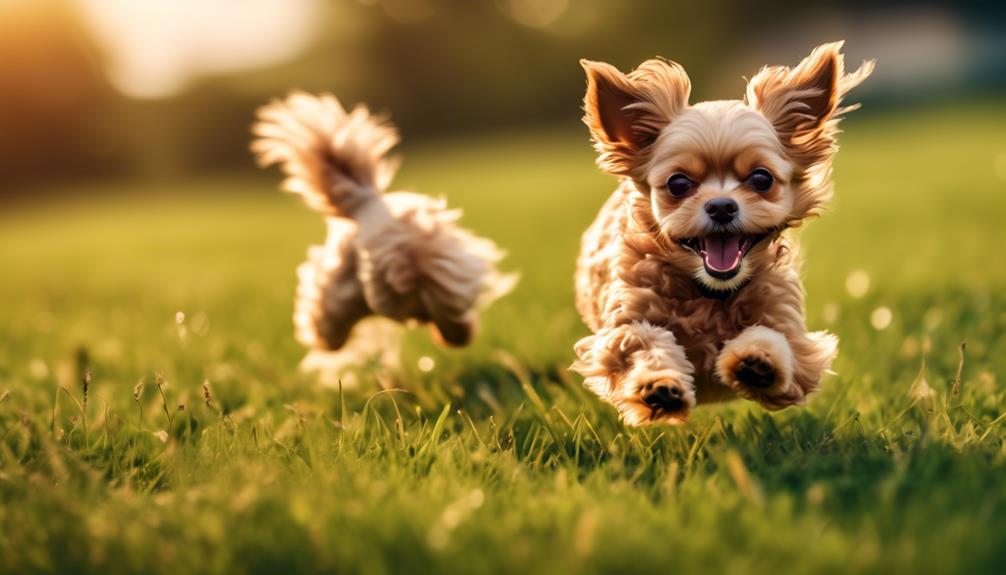
Exercise is an essential aspect of caring for a Chi-Poo, as they have high energy levels and require regular physical activity to stay healthy and happy. Here are the exercise requirements for a Chi-Poo:
- Daily walks: Chi-Poos benefit from at least one daily walk to burn off excess energy. Aim for a minimum of 30 minutes to an hour of walking each day.
- Playtime: Chi-Poos love to play, so incorporating interactive play sessions into their routine is important. Engage them in games like fetch, tug-of-war, or hide-and-seek to keep them mentally stimulated and physically active.
- Mental stimulation: Chi-Poos are intelligent dogs, so providing mental stimulation is crucial. Puzzle toys, obedience training, and learning new tricks can help keep their minds sharp and prevent boredom.
Remember to tailor the exercise routine to your Chi-Poo's age, health, and energy levels. Regular exercise won't only keep them physically fit but also mentally stimulated and content.
Chi-Poo Grooming Needs
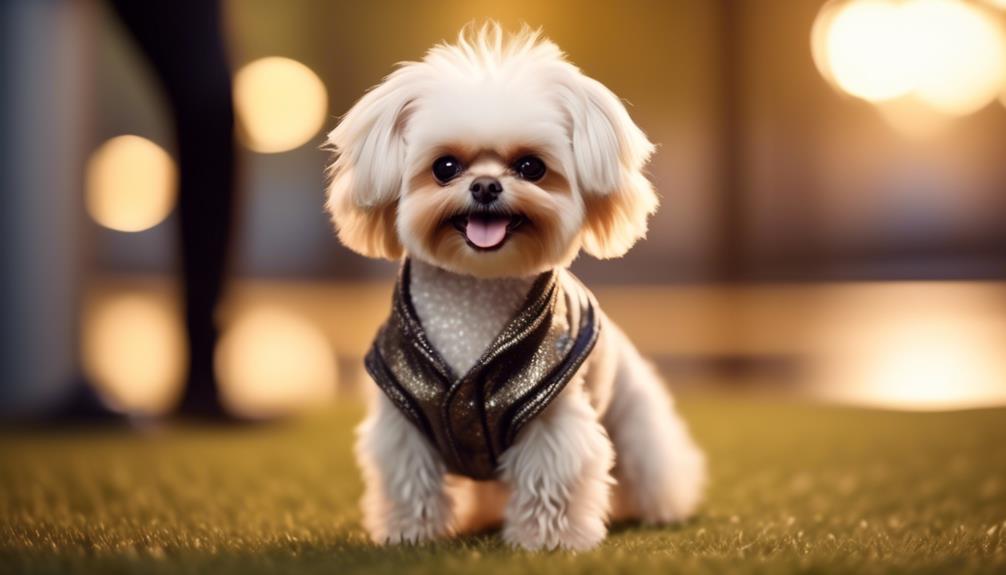
Now let's move on to the grooming needs of a Chi-Poo, a mixed breed dog that requires regular care to keep their coat healthy and looking its best.
Chi-Poos typically have medium-length coats that are low-shedding, making them a good choice for allergy sufferers. To maintain their coat, regular brushing is necessary to prevent matting and tangling. Aim to brush your Chi-Poo at least 2-3 times a week, using a slicker brush or comb.
They may also require occasional trimming to keep their coat at a manageable length. Additionally, regular bathing is essential to keep their coat clean and remove any dirt or debris. It's important to use a gentle dog shampoo that won't irritate their sensitive skin.
Chi-Poo Adoption and Breed Recognition

Chi-Poo adoption is a popular choice for those looking for a mixed-breed companion that combines the traits of both Chihuahuas and Poodles. Some Chi-Poos end up in shelters or rescue groups, making adoption a great option for those interested in this breed. It's important to consider adopting from a reputable source and ensuring the dog's health and temperament align with your needs.
While Chi-Poos aren't recognized by the American Kennel Club, they're recognized by several breed registries. These registries help provide recognition and documentation for Chi-Poos, even though they aren't considered a purebred breed.
Chi-Poos are generally small, weighing between five to 20 pounds and standing five to 15 inches tall at the shoulder. However, there's variation in size, with some Chi-Poos being smaller or larger. Keep this in mind when considering adoption and the space you have available for a dog.
Frequently Asked Questions
What Are Some Common Health Issues That Chi-Poos May Be Prone To?
Chi-Poos may be prone to common health issues such as overactive tear glands, hypoglycemia, glaucoma, and luxating patellas. Regular veterinary checkups and good care are important to detect and manage these concerns for your Chi-Poo's overall health.
Are Chi-Poos Recognized by the American Kennel Club?
No, Chi-Poos are not recognized by the American Kennel Club. However, they are recognized by several other breed registries. So, while not AKC recognized, they still have their own recognition.
How Are Chi-Poos Different From Their Chihuahua and Poodle Parent Breeds?
Chi-Poos differ from their Chihuahua and Poodle parent breeds in terms of size, coat length, and temperament. They are a mixed breed, combining the best traits of both breeds, resulting in a playful, intelligent, and adaptable companion.
Can Chi-Poos Be Left Alone for Long Periods of Time?
Yes, Chi-Poos can be left alone for long periods of time. They are independent and can tolerate being by themselves. However, it is important to provide them with enough mental and physical stimulation when you are home.
What Are the Recommended Exercise Requirements for Chi-Poos?
To keep your Chi-Poo happy and healthy, they require regular exercise. Aim for daily walks or play sessions to help burn off their high energy levels. Engaging in activities together will strengthen your bond.
What are the differences between Chi-Poo and Chigi mixed dog breeds?
The Chi-Poo and Chigi mixed breed characteristics set them apart from each other. Chi-Poos have a mix of Chiuhuahua and Poodle traits. On the other hand, Chigis are a mix of Chihuahua and Corgi traits. Understanding these unique traits is key to choosing the right mixed breed for your lifestyle.
Conclusion
In conclusion, the Chi-Poo mixed breed dog is a wonderful choice for anyone looking for a furry companion that can adapt to various living situations.
With their playful and intelligent nature, Chi-Poos make great pets for both single-person households and families with children.
Their adaptability, tolerance for being alone, and ability to withstand different weather conditions make them suitable for apartments or spacious homes.
Consider adding a Chi-Poo to your family and experience the joy and love they bring.




